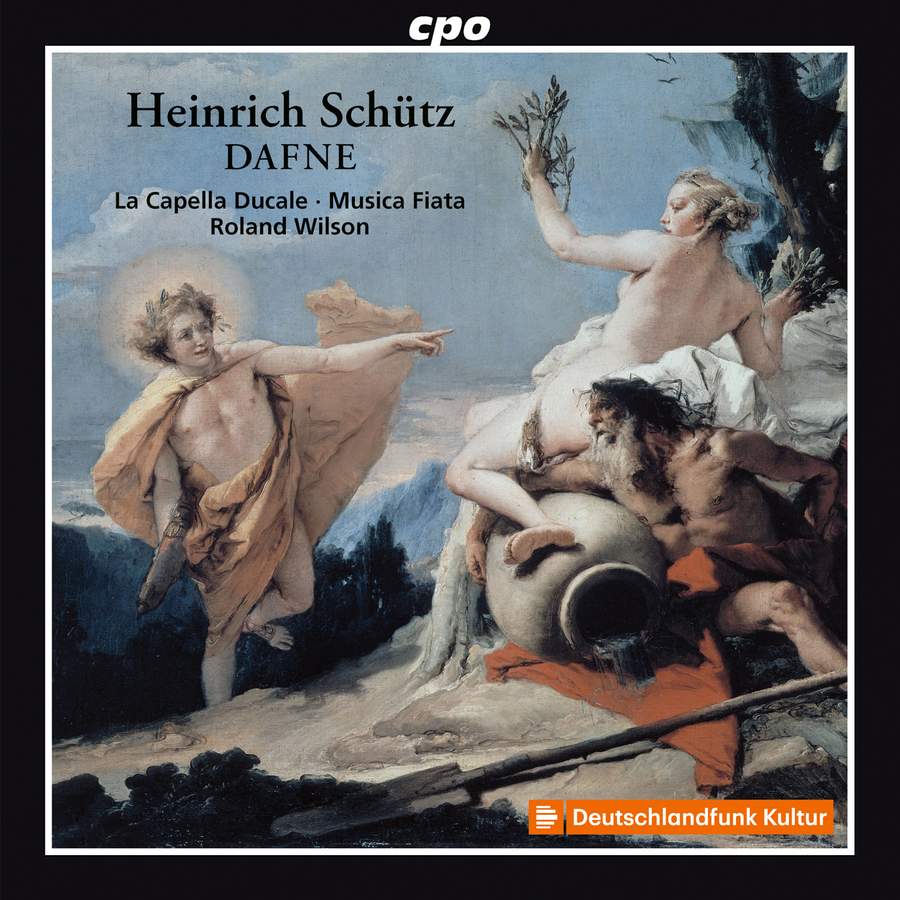SCHÜTZ Dafne (Wilson)
View record and artist detailsRecord and Artist Details
Genre:
Opera
Label: CPO
Magazine Review Date: 10/2022
Media Format: CD or Download
Media Runtime: 76
Mastering:
DDD
Catalogue Number: CPO555 494-2

Tracks:
| Composition | Artist Credit |
|---|---|
| Dafne |
Heinrich Schütz, Composer
(La) Capella Ducale David Erler, Shepherd, Countertenor Georg Poplutz, Ovidus; Shepherd, Tenor Joachim Höchbauer, Shepherd, Bass Magdalena Podkoscielna, Venus; Nymph, Soprano Magdalene Harer, Cupido; Nymph, Soprano Marie Luise Werneburg, Dafne, Soprano Musica Fiata Roland Wilson, Conductor Tobias Hunger, Apollo, Tenor |
Author: David Vickers
Alas, the music of Schütz’s Dafne is entirely lost. Whether or not the ‘pastoral tragi-comedy’ was really the first German opera, its performance in April 1627 celebrated the marriage of the Elector of Saxony’s daughter to the Landgrave of Hesse-Darmstadt. Martin Opitz’s published libretto paraphrased and remodelled Ottavio Rinuccini’s favola in musica, which had been set to music by Peri (Florence, 1598) and Gagliano (Mantua, 1608). In a prologue set in the Elysian Fields, Ovid proclaims the cruelty and intensity of love. The ensuing drama presents Venus and Cupid (described as the ‘little archer’, a pun on ‘Schütze’) punishing the boastful Apollo so that he becomes enamoured with the uninterested nymph Daphne, who escapes the god’s rapacious clutches by metamorphosing into a laurel.
Roland Wilson compares his speculative reconstruction to playing advanced sudokus. He proposes that a dozen extant Schütz works function perfectly as parodies for ‘about half of the total’ of the set pieces, and adapts Gagliano’s music for the wordier German recitatives. An intrada by Samuel Scheidt is played with impeccable chiaroscuro by the instrumentalists of Musica Fiata. Ovid’s prologue is sung with sweet intimacy by Georg Poplutz. Battle music to convey Apollo defeating the dragon Python, taken from the large-scale polychoral motet Es erhub sich ein Streit im Himmel, segues cleverly into Schütz’s German contrafactum of Monteverdi’s canzonetta ‘Chiome d’oro’ (sung blithely by Tobias Hunger).
The fateful encounter between Apollo and Daphne uses sinfonias from Symphoniae sacrae (Venice, 1629), and the same source is the basis for the god’s rapturous reaction to the nymph running away; the ensuing chorus of shepherds is one of several parodies of duets on poems by Opitz. Wilson uses clay pipes to create nightingale sound effects in music adjusted from O der grosser Wundertaten (composed in 1634 for a royal wedding in Copenhagen). As Cupid and Venus, Magdalena Podkoscielna and Magdalene Harer combine with cheeky lightness in chirpy songs from the Dresden court lutenist Johann Nauwach’s Teutscher Villanellen (pubished in 1627, and dedicated to the newlyweds).
Several ritornellos by Biagio Marini and Alessandro Grandi’s exquisite Passiontide motet O vos omnes (adapted for Apollo at the start of Act 5) are drawn from Venetian publications of the mid-1620s. Daphne’s mournful petition to her father (the river god Peneus) for her transformative escape is Schütz’s chromatically infused lament on the death of his wife (Mit dem Amphion zwar mein Orgel und mein Harfe, 1625), and it is sung beautifully by Marie Luise Werneburg; her moment of metamorphosis is an instrumental interlude for trombones, cornettos and strings that parodies Veni, Sancte Spiritus (c1620). Showcasing musicianship of nuanced imagination, this intrepid recreation offers an eclectic assortment of little-known Schütz pieces. Only a fraction of the intrepid reconstruction’s chapter and verse is mentioned in the brief booklet note, so hopefully Wilson will make a fuller explanation available elsewhere.
Discover the world's largest classical music catalogue with Presto Music.

Gramophone Digital Club
- Digital Edition
- Digital Archive
- Reviews Database
- Full website access
From £8.75 / month
Subscribe
Gramophone Full Club
- Print Edition
- Digital Edition
- Digital Archive
- Reviews Database
- Full website access
From £11.00 / month
Subscribe
If you are a library, university or other organisation that would be interested in an institutional subscription to Gramophone please click here for further information.




